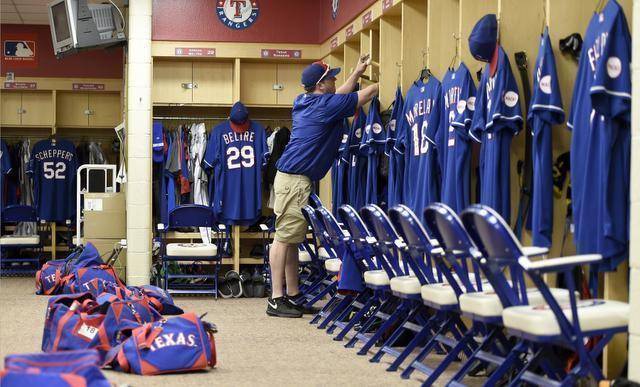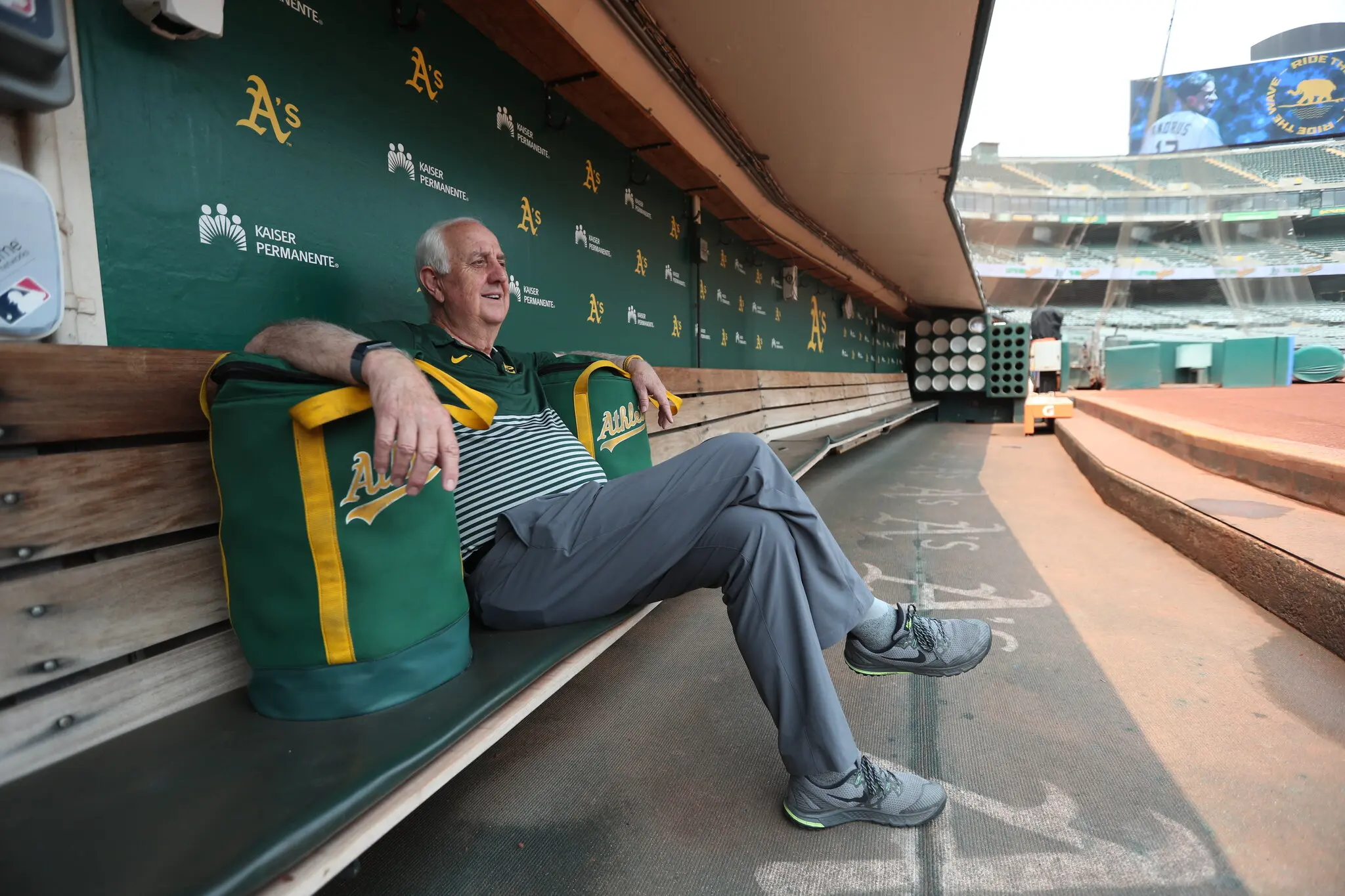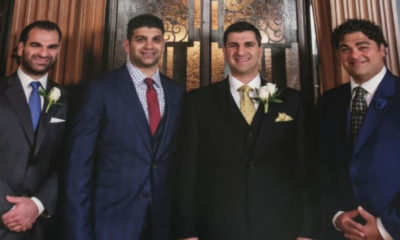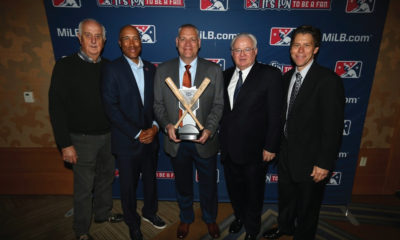By Stefan Stevenson | March 28, 2015
sstevenson@star-telegram.com
Dream jobs are rare. Talk to most major league baseball players and they’ll tell you they’re living their dream. Most are thankful for each day they get paid to suit up in a clubhouse and play the game they love.
Rarer still, however, are the jobs to maintain order in that clubhouse. Each ballpark has a small group of full-time employees whose job it is to make sure the players have what they need inside the secluded sanctity of a major league clubhouse.
Four employees plus an extended cast of seasonal workers — including bat boys and attendants — are dedicated to making sure the Texas Rangers players and the visiting team have everything they need.
Richard “Hoggy” Price, the Rangers’ equipment and home clubhouse manager, keeps the machine running with his assistants Dave Bales and Brandon Boyd and visiting clubhouse manager Kelly Terrell.
They’re the first ones to arrive to the ballpark, at about 10:30 a.m., and the last ones to leave, typically around 1 a.m.
“It’s perceived as a job, but the hours you put in, it’s a life,” said Hoggy, who has worked for the Rangers since 1977 and is in his sixth year as the clubhouse manager.
It’s a life they love.
Boyd, 34, has been working toward this job since he was 12 and growing up in Winter Haven, Fla., home of the Cleveland Indians for spring training. He worked out a deal with his junior high physical education teacher so he could be the Indians’ bat boy each spring. Eventually, he got a job as the clubhouse manager for the Rangers’ Class A affiliate in Clinton, Iowa, in 2003. From there, he moved up to Double A Frisco before joining the Rangers in Arlington in 2010.
“We love what we do,” Boyd said. “We’re blessed to be able to do what we do.”
Bales, 53, has been with the Rangers since 1986. He grew up in Tulsa and got his start with the Rangers’ former Double A affiliate in 1982. He worked a year for the Triple A team, then in Oklahoma City, before getting a job in the Rangers’ visiting clubhouse. He worked there from 1986-89 before switching to the home clubhouse in 1990 as an assistant for the late Rangers clubhouse manager Joe Macko. The Rangers are wearing patches honoring Macko on their sleeves during spring training. Bales moved back to the visitors’ side for five years before returning to the Rangers’ clubhouse in 2001.
“If you’re going to do it for just a year or two, the visiting side is probably where you’d have a lot of fun getting to meet everybody,” said Bales, who has seen all the greats of the game come through Arlington. “For long-term connections, I think you feel more a part of the family in the home clubhouse.”
That family connection runs deep between the players and their clubhouse attendants. They are the ones who make sure each player and coach has a clean uniform, clean cleats, underwear, undershirts, socks and hats each day, all hanging perfectly in the lockers each morning.
“They’re a big part of what we’re doing here every day,” catcher Robinson Chirinos said. “They have everything ready for us. They’re the first ones here and the last to leave.”
Terrell, 44, is in his 29th season with the Rangers. He’s been the visiting clubhouse manager the past 15 seasons. He runs the visiting clubhouse in Surprise, Ariz., too. His first job with the Rangers was a bat boy in 1987. Six clubhouse attendants work with him during the season.
Special bonds
The clubhouse managers share a special bond with the players, one that is not easily broached. Boyd and Bales were reluctant to talk about themselves and the job they do out of respect for the players. The best stories — the humorous moments with players, the touching times when a player offered support during a personal crisis — those were off-limits. Instead, they all agreed, the focus deserves to be on the players.
“We’re like umpires. If you’re noticed that usually means something went downhill fast or caused a problem. We don’t want to be noticed,” said Hoggy, who worked for Delta Airlines for 29 years while working for the Rangers. He retired from Delta in 2010.
It’s their job to not only put out fires when they arise, but to see a problem that could flare up and extinguish it before it even happens.
A few years ago the team was playing the Padres in San Diego and Yu Darvish was pitching. Darvish had been hitting left-handed so his travel bag was packed with a left-hitting helmet. But in San Diego, Darvish decided to bat right-handed, leaving him without the correct helmet (ear flap on the left side).
“So two hours before the game, after a few phone calls, we realized Neftali Feliz wore the same-size helmet,” Hoggy said.
Crisis averted.
On a trip to Houston several years ago, Josh Hamilton did not have the correct cleats in his travel bag. They were still in the clubhouse in Arlington. So Hoggy bribed somebody with tickets to pick up the cleats in Arlington and drive them down to Houston.
“We got them to him before the game started,” Hoggy said. “They didn’t get packed. They were cleaned and not put back in the bag. A player never forgets. We didn’t get it packed. It’s never on the player.”
“That’s how we want it to be,” Bales added.
‘Jersey-making nightmare’
The two biggest priorities for the clubhouse attendants are uniforms and bats. Each player has his preference and specifications on how he wants his jersey to fit, how he wants to wear his pants. Same goes for bats. If a player finds a new bat to his liking, the clubhouse managers put in the order. Elvis Andrus has a special model made from two styles, the handle from one and the barrel from another. Each player starts with about 24 bats. If he starts running low, the clubhouse attendants are on top of it, ordering replacements, which can take several weeks to arrive.
Each time a new player is called up from Round Rock or Frisco the clubhouse managers are the first to know. They get a text and they’re quickly setting up the locker, adding the player’s name, finding out his jersey specifications, and having it tailored, sometimes in less than an hour.
Bales, who’s in charge of uniforms, keeps a list of player jersey preferences. Do they like more room in the thighs, baggy at the bottom or tight? Do they want an extra inch added to their sleeve or do they want it really tight around the biceps like Sammy Sosa?
“Uniforms aren’t just on the shelf and here you go,” Boyd said. “A lot of the guys are funny about their hats. Some don’t ever want to change their hats. Some are superstitious. Some do.”
Last year, for instance, with all the injuries and personnel changes, “was a jersey-making nightmare,” Hoggy said.
The players don’t take the help for granted. And the Rangers’ organization, Hoggy said, treats them very well. All four attendants received AL Championship rings a few years back.
“People don’t understand what they really bring to the table for the players,” Rangers pitcher Derek Holland said. “They’re cleaning up our stuff, they’re doing all the dirty work. They get overlooked, and that’s the one thing people should know is these guys take care of us very well. I think we’re actually pretty spoiled with what we’ve got. Hands down they’re the best crew around.”
Heart of the operation
The clubhouse crew are at the heart of the team’s day-to-day operation. The Rangers’ front office, past and present, knows the integral role they have. There’s a trust the players put in them that can’t be broken.
“Within that clubhouse it becomes Fort Knox because it has to be,” Hoggy said. “If our integrity is ever questioned with a player or among ourselves, we have lost everything.”
Former President George W. Bush, former owner of the Rangers, was visiting a few years ago and made a point to check in on the clubhouse managers.
“I hadn’t seen him in 10 years and he walked right into the visiting clubhouse and says ‘Hey, Kelly, how you doing?’ Terrell said.
Bush popped in to visit with Bales in the laundry room during another visit, asking how his wife and kids were doing.
“It means a lot to you,” Bales said about the relationship with famous friends. “You have to keep it professional, though. You want them to understand you’re here to do the job and you help them as much as you can.”
Said Boyd: “They put a lot of trust in you and the job you do. They treat us very well and respect what we do, and they know they can depend on us.”
Whatever a player needs, whether it’s getting street clothes to the dry cleaners, helping get tickets to family or making reservations at a restaurant, “they are right on top of it,” pitcher Nick Martinez said. “I can’t speak highly enough about them. I love each and every one of them.”
That love goes both ways. They’re all doing what they love to do.
“I’m a 56-year-old kid every day my feet hit the floor because I get to go to the ballpark,” Hoggy said. “A lot of times we get wrapped up in issues and then I take a step back and I remember my everyday job at the airport. Trust me, my worst day at the ballpark is better than any day I ever had at the airport.”
Stefan Stevenson, 817-390-7760
Twitter: @StevensonFWST
By the numbers
25 Loads of laundry a day done in five washers, including three commercial washers.
425 Towels make up 10 loads of laundry a day.
2 Buckets of gum a day.
6 Boxes of sunflower seeds a day.
180 Balls prepared with baseball rubbing mud for each game.
6 Boxes of K cups for coffee each day.
360 Bottles of water a day.
80 Pairs of cleats cleaned each day.
2 Cans of Scrubbing Bubbles used a day to clean the cleats

Clubhouse Manager of the Year
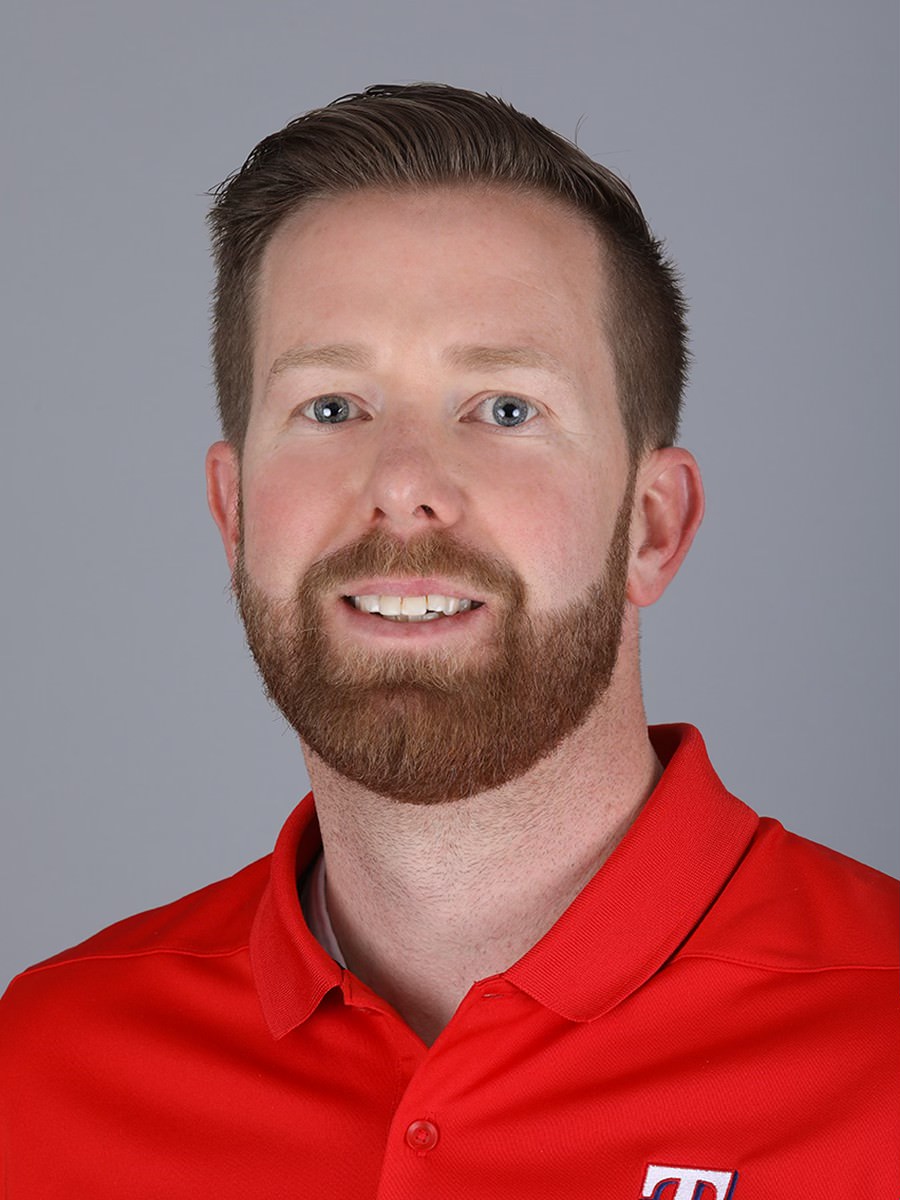
BRANDON BOYD Texas Rangers Home Clubhouse Manager of the Year
Clubhouse Manager of the Year
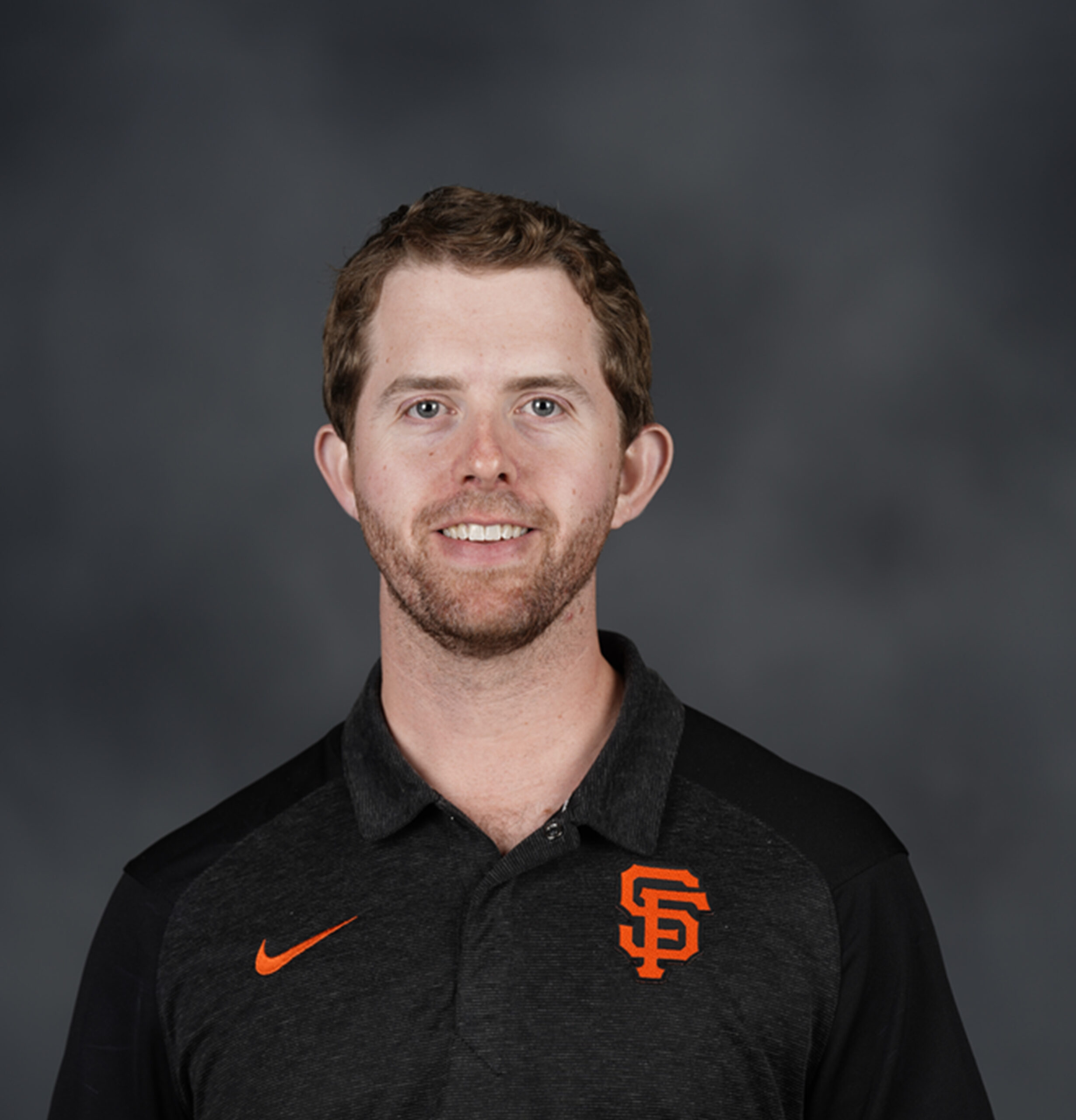
GAVIN CUDDIE San Francisco Giants Visiting Clubhouse Manager of the Year
